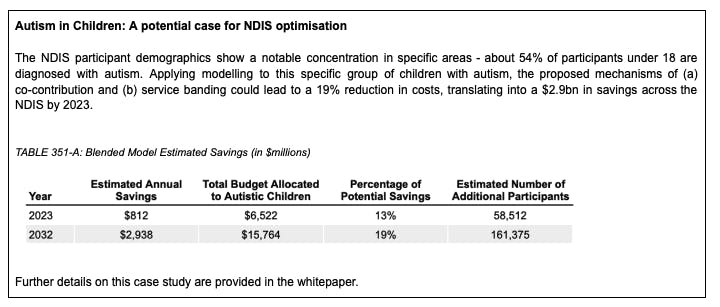July 12, 2023
An Examination of Co-contribution and Service Banding in the NDIS

The National Disability Insurance Scheme (NDIS) is a key support for 590,000 individuals with disabilities across Australia. In response to the evolving needs of this dynamic system, Kismet has published a whitepaper to consider the feasibility of co-contribution and service banding concepts.
The whitepaper explores a co-contribution system similar to the Childcare Co-Contribution (CCS) Model. High-income households would no longer receive full NDIS subsidies under this proposal. This adjustment could free up resources, enabling a broader distribution of benefits and allowing more participants to benefit from the scheme. Conversely, low-income households would continue to receive 100% NDIS subsidies, ensuring that these households are fully supported in meeting the needs of their family members with disabilities. The proposed model aims to redistribute resources, providing access to critical services for those least able to afford them.
Additionally, the whitepaper examines the idea of service banding whereby services paid for by the NDIS are categorised based on necessity, with subsidy levels tailored accordingly. Critical services, which could include essential support such as support workers, would retain a full 100% subsidy. This banding ensures that necessary care and support for individuals with disabilities remains completely accessible, regardless of their financial circumstances. Conversely, non-critical services, including tasks like lawn mowing, would be partially subsidised. This reduction in subsidisation for non-critical services is designed to promote a more efficient allocation of NDIS funds.
These strategies aim to distribute the burden of contributions, maintain NDIS affordability and sustainability, and increase the system's reach. Based on the whitepaper's modelling, these strategies could lead to significant savings. Optimising NDIS expenditure by 5% by 2032 would allow the NDIS to accommodate up to 273,000 additional participants (18 and under).

The whitepaper acknowledges the complexities of such changes and presents its findings as a starting point for further discussion. For a more detailed examination of this proposal and its potential implications for the future of the NDIS, the full whitepaper is available for download.
Kismet is committed to increasing access to healthcare, with an initial focus on the NDIS. We believe that finding disability and healthcare services should be accessible and easy, and by implementing the strategies outlined in this whitepaper, we can create a more inclusive and efficient NDIS that benefits a larger number of individuals and families in need.
Looking for an NDIS provider?
Kismet can help you find the best health service or NDIS provider to support your journey.

